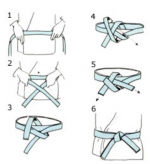Difference between revisions of "Belt"
(Page creation) |
|||
| (5 intermediate revisions by the same user not shown) | |||
| Line 1: | Line 1: | ||
| − | + | '''<big>Meaning of each belt</big>'''<br> | |
| + | |||
| + | [[English|Back to Welcome Page]] <br> | ||
{{#ask: | {{#ask: | ||
[[Theory::Belt]] | [[Theory::Belt]] | ||
| + | [[Language::English]] | ||
|?Subject=Subject | |?Subject=Subject | ||
|Language='English' | |Language='English' | ||
| Line 11: | Line 14: | ||
}} | }} | ||
| + | [[Category:Theory]] | ||
[[Category:UK]] | [[Category:UK]] | ||
| − | |||
Latest revision as of 14:46, 11 March 2020
Meaning of each belt
Meaning of the white belt ( TI ) - 10th Kup
White belt signifies innocence, like a beginner who has no prior knowledge of Taekwondo.
To know how to correctly tie up a belt, follow instructions in the image (click on the image to enlarge)
Back to top of page - Back to Welcome Page
Meaning of the yellow belt ( Ti ) - 8th Kup
The yellow belt means the earth from which the plant takes root and sprouts as the Taekwondo foundation is laid.
Back to top of page - Back to Welcome Page
Meaning of the green belt ( TI ) - 6th Kup
Green: The color of the plant that grows and develops, as the skills in Taekwondo increase.
Back to top of page - Back to Welcome Page
Meaning of the blue belt ( TI ) - 4th Kup
Blue belt signifies the heaven towards which the plant matures into a towering tree as knowledge in Taekwondo increases.
Back to top of page - Back to Welcome Page
Meaning of the red belt ( TI ) - 2nd Kup
Red belt signifies danger, cautioning the student to exercise self-control and warn the opponents to stay away.
